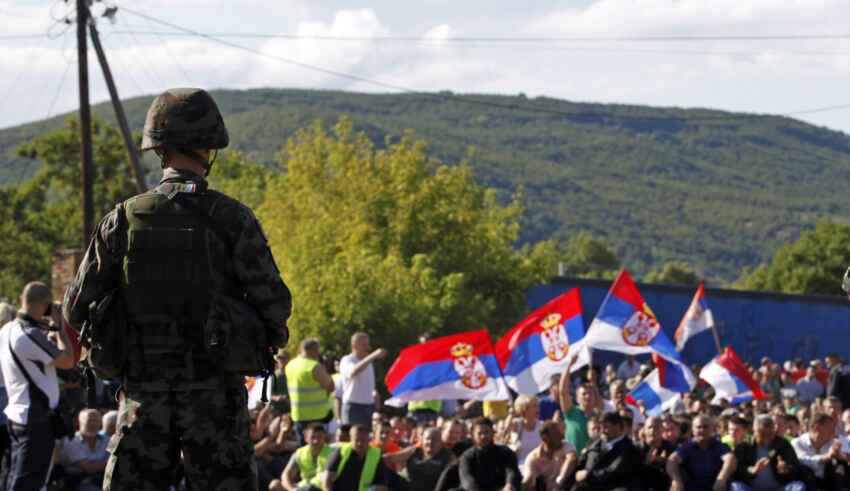
After weeks of increasing tensions between Kosovo and Serbia, with media of the latter country claiming that the government of Kosovo is orchestrating an attack against the Kosovo Serbs in the State’s northern region, Serbian president Aleksandar Vucic put the armed forces deployed along the border between the two States in the highest level of alert, making them ready to intervene in case of an armed outbreak. Right after the announcement, Kosovo Serbs in Mitrovica, a city divided on ethnic cleavages, set up roadblocks in their areas. It is not the first time that they claimed to act for protecting Serbian minorities and for protesting for the alleged Kosovan plot involving terrorism against Serbs. In response, Kosovan interior minister Xhelal Svecla asserted that responsibility for those acts lied on paramilitary formations controlled by Serbia and acting under the influence of Russia with the aim of destabilising Kosovo. He called for a NATO intervention to remove the barricades although affirming that, in case of inactivity, the government of Kosovo will have the capacity and the resources to act.
Tensions between the two States has been raising throughout the year for many reasons. Due to a decision involving car registration plates requirements, Kosovo Serbian drivers were obliged to display Kosovan licence plates on their vehicles: as a matter of symbolism, Kosovo wanted to underline its sovereignty, but Serbian communities within the country felt a violation of their identity. As retaliation, a relevant number of ethnic resigned from Kosovo’s national institutions. Another issue of concern has been the recent judgement pronounced by the Kosovo Specialist Chambers in the Mustafa case, where the former commander of the Kosovo Liberation Army was found guilty of war crimes and sentenced to 26 years imprisonment, sparking anger at home. The same reaction was triggered in December, when Kosovo presented an application to access the European Union (membership is dependent upon reaching an agreement with Serbia to normalise relations).
The origin of the long-running dispute is the unilateral independence that Kosovo declared in 2008: Serbia has never recognised its independence (as well as Russia and China, that condemned the KFOR mission and its intervention within the region) and continues to think that Kosovo is part of its territory, despite not having any type of control over it. Although the two countries are engaged in a dialogue to reach the normalisation of mutual relations led by the EU, no agreement has been reached yet; the same insufficient outcome applies to the agreement of economic normalisation, signed under the aegis of the US and loudly sponsored by former president Trump. Against cooperation, Serbia claims that Kosovo is not implementing the provision of the 2013 Brussels Agreement, which committed the Kosovan government to grant greater autonomy to ethnic Serbs within the country through the constitution of an association of Serb majority municipalities.
Despite Belgrade announced the barricades takedown few days later, Miroslav Lajčák, the EU special representative for the Belgrade-Pristina dialogue, expressed his concern about the level of mistrust between the two Balkan countries. [1] While Serbia is intensifying its military presence on the border, the US and the EU called for a de-escalation, pushing for a diplomatic resolution involving an EU-facilitated dialogue between Kosovo and Serbia. Lajčák insisted on finalising an agreement before March 2023, but it appears to be unlikely to solve the impasse before the deadline. Any effort led by the EU proved to be unsuccessful in the past, and the dialogue that was supposed to be ‘comprehensively constructive’ turned out to be blind especially in terms of mutual recognition: as Vucic declared in many fora, the Serbian government will never recognise the independence of Kosovo, neither directly nor implicitly. [2]
From an economic but also military perspective, Serbia gains more political advantages in constantly fuelling the threat of an imminent armed attack rather than initiating a war against the NATO contingent for real. This perpetual impasse and the EU inability to find a durable solution inhibits the EU credibility as a leader for the resolution of conflicts on the global stage. It also reflects internal tensions within the EU, with the five member States not recognising Kosovo undermining the capacity of the European Union to stand up with a strong common position. As a matter of fact, a political settlement between Serbia and Kosovo is heavily dependent upon recognition: not only between the two States involved, but also among the members of the international community. Moreover, what is really missing in the region are initiatives oriented towards social integration among the population, as proven by the sharp urbanistic compartmentalisation of cities like Mitrovica, but also symbolically by the act of erecting barricades.
[1] https://www.politico.eu/article/serbia-kosovo-eu-western-balkan-miroslav-lajcak-eu-frets-crisis-cycle-will-derail-deal/ [2] https://ecfr.eu/article/beyond-the-status-quo-a-perspective-from-serbia-on-relations-with-kosovo/By The European Institute for International Law and International Relations.















